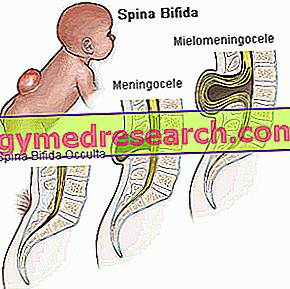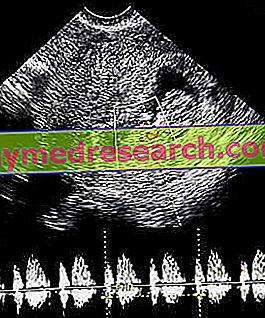This is a rather new and developing technique. In practice, by means of an ultrasound scanner, the thickness of the abdominal fold of the fetus is detected. This diagnostic study was suggested by an experimental study which revealed many correlations of considerable health importance both for the unborn child and for the pregnant woman
Category fetal health
Generality Anencephaly is a very serious congenital malformation due to failure to develop the brain and skull bones . This condition is not, unfortunately, compatible with life: the children who are affected are destined to die prematurely or survive only for a few hours. The ultrasound diagnosis of anencephaly is very simple and is based on the failure to visualize the fetal skull in the first trimester of pregnancy
Congenital anomaly Among the malformations of the central nervous system, spina bifida plays a leading role: it is a serious congenital anomaly of the spinal column and spinal cord, which often heavily compromises the patient's quality of life. Despite being an incurable disease, spina bifida can be prevented: after a brief analysis of the diagnostic methods available, we will focus on preventive practices and current treatments aimed at alleviating the symptoms induced by the disease
Key points Spina bifida is an incurable genetic malformation affecting the spinal column: it is a disease of the central nervous system in which some vertebrae, not completing their development, favor the exit of meninges and / or spinal cord from a fissure in the spine. Spina bifida: causes The cause of spina bifida lies in a defect of closure of the neural tube, the structure from which the CNS originates
Definition of spina bifida The term "spina bifida" defines a genetic defect of the spine, characterized by the lack of welding of the vertebral arches. Spina bifida is a complex and heterogeneous disease, probably the most common malformation of the peripheral nervous system. Spina bifida can affect any segment of the spine (cervical, thoracic, lumbar, sacral); despite this, most cases of spina bifida are diagnosed at a low back
This is a rather new and developing technique. In practice, by means of an ultrasound scanner, the thickness of the abdominal fold of the fetus is detected. This diagnostic study was suggested by an experimental study which revealed many correlations of considerable health importance both for the unborn child and for the pregnant woman
Generality The calculation of the weeks of pregnancy is an important estimate to take into consideration to know the most probable date of birth and to monitor the development of the fetus inside the uterus. The duration of gestation is approximately 280 days , ie 40 weeks taking as a reference the beginning of the last menstruation
Generality Fetal echocardiography is an exam that allows you to study the anatomy and heart function of the child when it is still in the womb. This survey is performed in the second trimester of pregnancy, in order to identify malformations and congenital diseases affecting the heart and large vessels
Biological Role In the red blood cells of the fetus it is possible to identify a form of hemoglobin different from the adult one. From the structural point of view, the fetal hemoglobin (α 2 γ 2 ) differs from the adult one (α 2 Β 2 ) due to the presence of two gamma chains instead of the two alpha chain In particular, fetal hemoglobin is formed by two α chains and two γ chains, consisting of 141 and 146 amino acids respectively. The
Generality Fetal hydrops is a serious medical condition, characterized by the accumulation of fluid in the subcutaneous tissues and in the serous cavities of a fetus or a newborn. There are two subtypes of fetal hydrops: non-immune fetal hydrops and fetal immune hydrops. Fetal non-immune hydrops is the most common subtype and may result from cardiovascular conditions, chromosomal abnormalities, infections, urinary or pulmonary malformations, diaphragmatic hernias or severe anemia
Generality The loss of the mucous plug is one of the signs that indicate the approach of the birth . This event consists in the expulsion of the mucus layer , which is formed inside the cervix, in the early stages of pregnancy . The function of the mucous plug is to provide protection for the fetus : by closing the cervical canal, this secretion - thick and dense - acts as a barrier against infectious agents or harmful substances that can come into contact with the uterine environment









